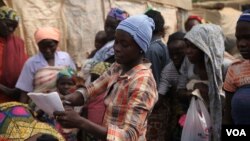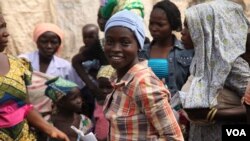Boko Haram struck again in Nigeria's northeast on Sunday, killing more than 30 villagers and kidnapping scores of people from Gumsuri. It is a now familiar pattern in the five-year insurgency.
VOA met one Nigerian woman who managed to escape Boko Haram and take refuge in the capital Abuja. Her story about what captivity is like under the brutal militant group is harrowing.
Boko Haram insurgents stole nearly everything from Blessing John: her family, her livelihood and her home.
In its violent campaign to impose strict Sharia law in northeastern Nigeria, Boko Haram has slaughtered thousands and kidnapped hundreds. It famously abducted more than 200 schoolgirls from the town of Chibok in April. Most are still missing.
On Thursday, residents reported that the militants had made off with more than 100 women and children, this time from the village of Gumsuri.
Painful memory rekindled
The latest incident reminds John of her own ordeal.
Before August, the 24-year-old John’s life in the Borno state town of Gwoza consisted of farming and selling medicine. She shared her house with her husband, two children and her grandparents.
That all changed the night the militants arrived. Shouting "God is great," they overpowered the soldiers, took over the town and declared it part of their caliphate. Townspeople urged the men of Gwoza to flee as the militants stormed through the streets.
Gwoza’s population was a mix of Muslims and Christians, John said. The militants immediately made their intent to change that clear.
Their mission was to get everyone to convert to their brand of Islam in Gwoza, she said. "They didn’t want to see a single Christian in the town."
When her husband of seven years refused to convert to Islam, the militants killed him. They did the same to young people in the town whom they feared could rise up against them in the future.
Taken captive
Christian women like John, along with children and disabled people, were separated and held in captivity as the extremists tried to force their conversion.
The militants order the captives to perform ablutions and pray. John said she tried but failed to do the ritual washing correctly, so they beat her and called her the daughter of an infidel.
During her captivity, John was shot three times: twice in the right foot and once in the back. At one point, militants put a knife to her throat to force her to convert to Islam, which she eventually did.
For two days, John was held captive with others in a pit the insurgents dug in the town. Then she was moved to a cell, where she was held with five other prisoners. From there, she escaped.
Escape into mountains
John used a nail to pick the padlock of her room, she recounted. She said a prayer, packed some clothes, then fled into the mountains, wandering for five days and before finding other people, she said. She renounced Islam once she was free from Boko Haram.
She escaped along with her 3-year-old son. It took her two months to locate her older son, a 6-year-old. She isn’t sure what happened to her grandparents.
John crossed into Cameroon and eventually back into Nigeria, making her way to a settlement called Sabon Kuchigora on Abuja’s bleak outskirts. Most of the people living there have fled violence in the northeast, and many are from Gwoza.
Home for John is a wooden shack with flimsy walls of empty cement bags stretched over plywood frames. Her money is gone, as are most of her possessions, seized by the people who transported her to Abuja in lieu of pay.
One of the few things she still has is a gold wedding ring on her left hand, a reminder of the life she lost.





